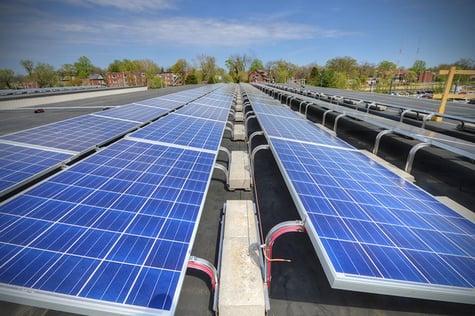
With the arrival of summer weather – and with many parts of the country experiencing record-breaking heat waves – it’s hard to ignore the power of the sun. It can make walking across the street seem like a marathon, it sends energy bills soaring, and it can make a parked car feel like a furnace. No wonder the sun gets a bad rap this time of year!
But instead of bemoaning the sun’s power, why not put that power to work for you? Installing solar panels on your commercial roof can reap huge benefits when it comes to reducing your electrical bill. Still, some building owners hesitate to take the plunge. Sometimes it’s because of the cost (although costs are decreasing rapidly, and government incentives can further soften the blow), but sometimes it’s because the owners and facility managers are worried about what solar panels will do to the integrity of the roof.
It’s a legitimate question. The good news is that properly installed solar systems shouldn’t detract from the roof’s integrity. The key, however, is proper installation. Here are some things to consider:
The Current Condition of the Roof
Solar panels are designed to last about 25 years. That’s why many installers recommend repairing or, ideally, replacing your roof before installing solar panels. Otherwise, you could find yourself paying to have the panels removed and reinstalled when it’s time for a new roof.
The Load Capacity
Before installing solar panels, any reputable provider will make sure your roof can handle the additional weight of both the system itself and, for non-penetrating systems, the ballast used to secure them. Fortunately, most of the rack systems being built today are extremely lightweight, adding somewhere in the range of three to five pounds per square foot. Keep in mind that some states and localities require a sign-off from a certified engineer before approving the project.
The Installation Method
There are two main types of solar panel installation: attached and ballasted. As with rooftop supports, ballasted systems are far superior when it comes to protecting the integrity of your roof, as each penetration of the membrane brings the risk of leaks. Again, however, it’s important to check your local code requirements.
Other factors
There are a few additional factors that affect the impact of solar installation on the integrity of the roof:
Access
A reputable installer will design a system that still allows access to rooftop supports and equipment as well as to the panels themselves.
Drainage
Standing water can damage your roof, so drainage is an important consideration. A good vendor will study your roof’s drainage patterns and install the system so as not to impede them.
Warranty
A reputable installer will take care not to void your roof’s warranty and will meet any conditions that may be included.
Utility interconnection
The utility interconnection is the means by which your solar system connects to the power grid. In addition to avoiding unexpected expenses, determining the ease of utility interconnection before a project begins will help you avoid having to make decisions that could make your roof more vulnerable to damage or warranty invalidation.
The bottom line? Properly installed solar panels are safe for your roof and good for your bottom line. Use these tips to help find an installer who will make preserving your roof’s integrity a top priority.





